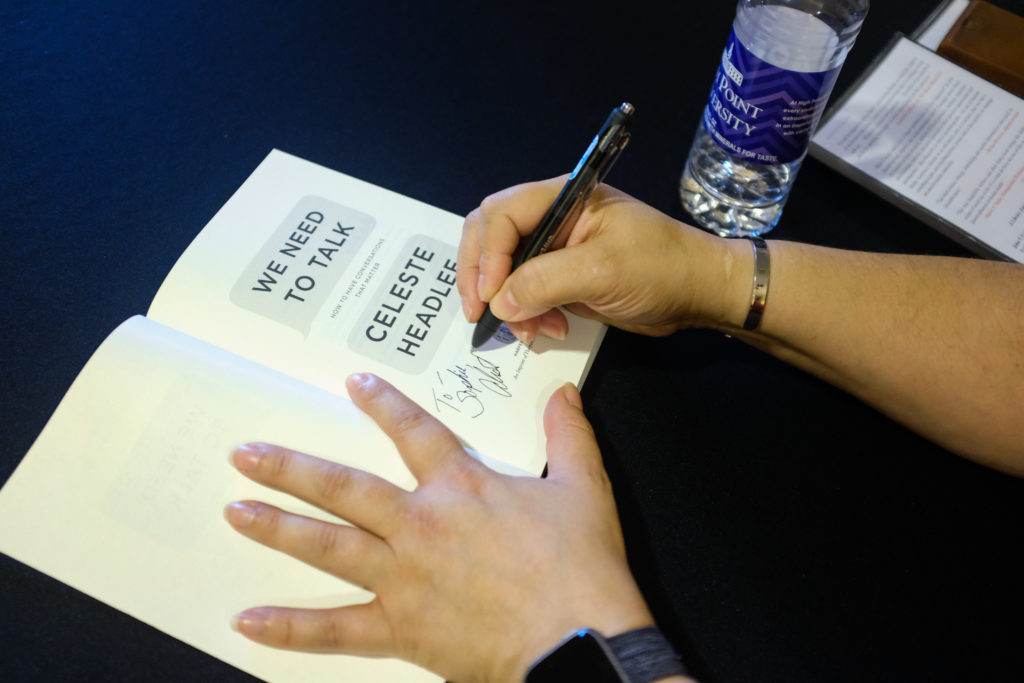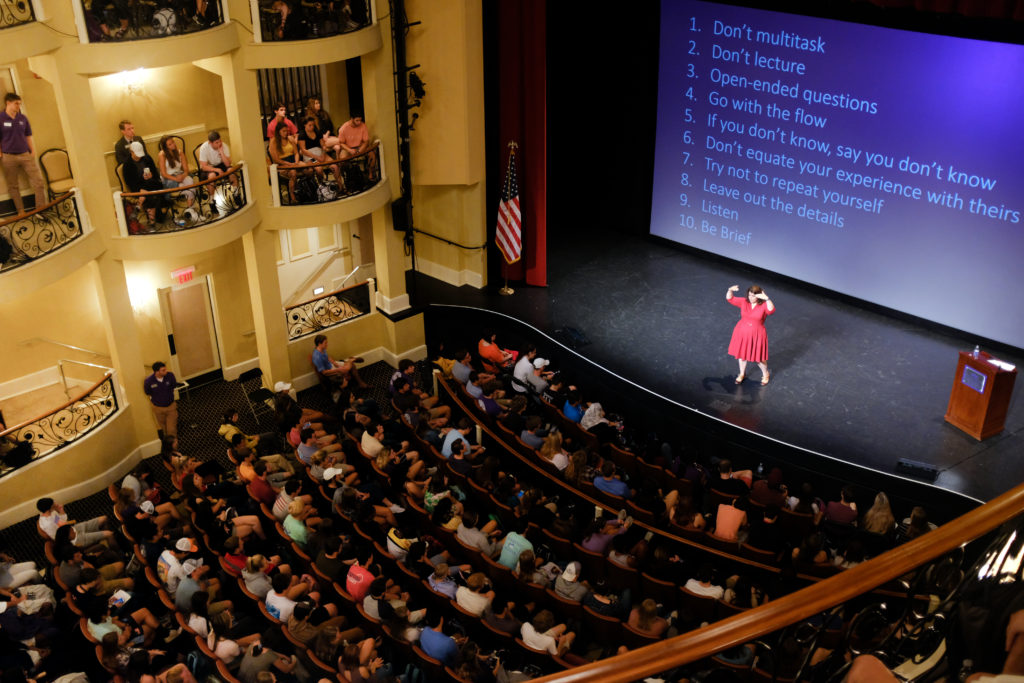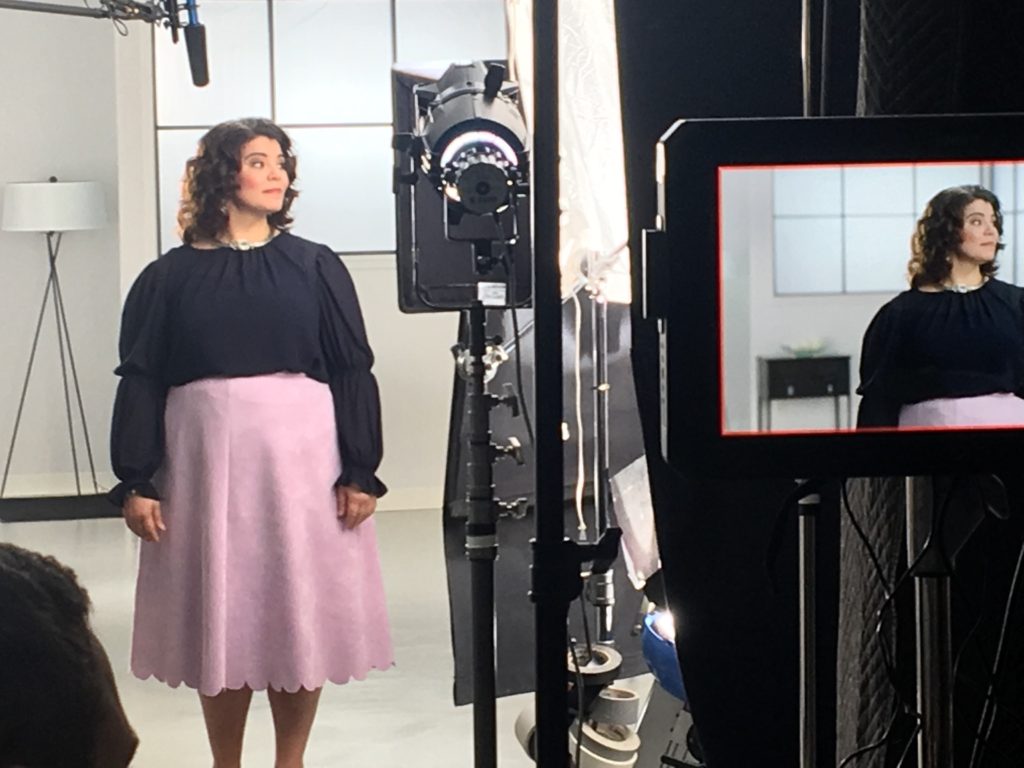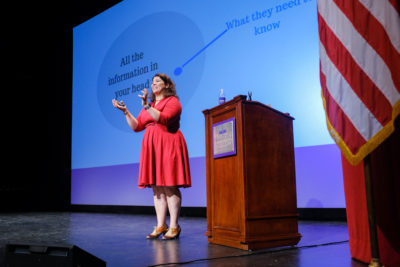“How can I become a paid public speaker?” This is one of the most common questions I get, and honestly, I am never quite sure how to answer it. I make a good portion of my living by giving keynote speeches and leading workshops, but I really have no idea how someone else might break into this industry.
There are lots of smart and inventive people in the world, with valuable insights to share and wisdom to impart. There are also plenty of people searching for inspiration and guidance, so there is room for many public speakers with diverse voices and experiences and expertise. But I’m hardly an expert on the business of public speaking. My expertise and experience in this field are limited to me and are probably not useful to others.
My journey from radio host to speaker was relatively unique. I gave a TEDx talk that went viral worldwide, which led to a bestselling book and a new career giving keynotes and leading workshops. I don’t have an answer for that question: “How do I become a public speaker?” because I didn’t try to become one; it just happened to me.

I can talk about my own experience. The information may help you and it may be useless, so take it or leave it. One caveat: by the time I was asked to deliver a TEDx talk and then deliver my first keynote, I had spent 16 years on live radio learning to speak off the cuff and write good scripts. I’d taken broadcast writing courses (which is really about writing for people to hear instead of read) and had years of coaching on my voice and my delivery.
So, I got a lucky break in that my TEDx talk touched a nerve on a broad level, but years and years of training had prepared me for that opportunity when it arrived. So, one answer to that question (how do I become a public speaker?) based on my own experience is: work as a live radio host for fifteen years and get years of training and then give a TEDx talk that goes viral.
All of my years in journalism have also taught me to do my homework, deal with specifics and get the facts. When I’m writing a keynote for an organization, I learn what I can about who they are and what challenges they face. Then, I tailor my message for them, without using vague phrases like “Be bold” or “Live your best life” or “Be open to new ideas.” I give tangible, actionable tips that are based on science, not my limited life experience.

Become an expert. I have invested countless hours becoming an expert in my field. This is essential because nearly all public speaking gigs include time for questions. Many speakers aren’t prepared for the random, wide-ranging questions they get and so Q&A can be awkward. I make sure that I know my subject so well I can answer almost every question. If I don’t know the answer, I say, “I don’t know” instead of guessing or estimating.
From the start, it was clear that I didn’t really know how the speaking industry worked. Like most jobs, it has its own rules and expectations and challenges. So, I hired experts. I have no idea how to build a brand, for example, so I found someone who does. I can’t make an attractive infographic to save my life, so I pay talented graphic artists to do that.
Hire experts. My logistical skills are lacking, so two brilliant women cross every T and dot every I for me, and I’m atrocious at salary negotiation, so I have a savvy manager who handles that part with grace and professionalism. Don’t assume that you can do an hour of reading on the internet and suddenly become as good at social media as someone with years of experience. Find an expert and treat them well. Also, once you hire an expert, let them do their job. If you hire a PR professional and you get an email asking you to do a podcast interview, forward it to your PR rep. Don’t interfere with their work.
A few random tips that I’ve learned along the way: have business cards made that specifically list you as a speaker, with your website information and your manager’s phone and email. Carry those cards at all times.
Keep it simple. Your slide presentation should be mostly pictures, no complicated graphs or charts, and easily read from the back of a ballroom.

Be humble. Talk about the mistakes that have led you to insight. Otherwise, your talk can come across as 45 minutes of unsolicited advice and, take it from a conversational expert, no one likes unsolicited advice.
Be reliable. Be on time or early, deliver what you promised, and ask lots of questions to make sure you understand what’s needed. Dress professionally and be kind to everyone you meet. That’s good advice for life, I think, but especially for situations in which you might be at a conference in Tampa and not realize that the person in flip flops getting lemonade is actually the president of the company.
Tell a story. No matter what your subject matter, your talk should have a beginning, a middle, and an end. Human beings learn best through stories and most of our history was passed on verbally. Reading is a recent innovation. So, write a script that is meant to be heard and not read. No long sentences with subordinate clauses; no excessive adjectives and technical terms. That’s not how people talk and it shouldn’t be how you speak.
Get there early. Fly in the night before. I used to try to arrive in the morning if I had an evening engagement, so that I could keep the trip as short as possible. That strategy quickly becomes disastrous though, because of bad weather, late planes, and missed connections. Just fly in the night before and get a full night’s sleep. You want to be rested and relaxed when you’re speaking to large groups of people. On the same note, don’t check bags. No need to take unnecessary chances like that.
Keep reading. If you are being hired as an expert, you’re expected to stay current on the newest research on your subject, as well as cultural trends. Keep notebooks (digital or otherwise) where you collect notes from articles, books, and studies. Update your content constantly. You may give a great speech to an organization, but if you don’t write new material, you can only work for them once.
As with any other profession, it’s tough to dabble in public speaking. Since it’s a large part of my job now, I have created systems and purchased equipment that makes it easier to travel and to deliver passionate, informative keynotes. When I was trying to do speaking gigs while holding down a full-time job, I was exhausted all the time. So, be aware of your own limitations and make sure you are getting enough rest.

All in all, public speaking can be rewarding. But it is a job, like any other. You have to take it seriously and work at it.
If you really want to do this, don’t talk to a speaker like me. Call a few speaker managers or speaker’s bureaus (they are two different things by the way) and get advice from an actual expert who has handled many speakers and understands what’s involved in breaking into the business. If you ask me how to become a speaker, the most honest answer I can give is: be a national radio host and then deliver a successful TEDx talk. I’m no expert. I’m just someone who got lucky (and had the necessary skills to take advantage of that luck). Get out there and make some luck of your own.
